英语倒装句的用法及举例
英语语法 倒装句在句子中的作用是什么

英语语法倒装句在句子中的作用是什么倒装句在英语语法中具有多种作用和功能。
它可以用于强调、疑问、条件句、否定句等语境中。
以下是倒装句在不同情况下的作用和用法:1. 强调:倒装句可以用于强调句子中的某个成分,通常是主语或副词。
通过将谓语动词或助动词置于主语之前,突出某个信息,使其更加显著。
例如:- Not only did he win the race, but he also broke the record.(他不仅赢得了比赛,而且还打破了纪录。
)- Only after the rain stopped did he realize his car was leaking.(直到雨停了,他才意识到他的车在漏水。
)2. 疑问:倒装句常用于构成疑问句,将谓语动词或助动词置于主语之前。
这种倒装句通常用于特殊疑问句、反义疑问句和部分否定句。
例如:- What time does the train leave?(火车几点离开?)- You don't like coffee, do you?(你不喜欢咖啡,是吗?)3. 条件句:倒装句可以用于表示条件的句子中,将谓语动词或助动词置于主语之前。
这种倒装句常用于以“should”引导的虚拟条件句。
例如:- Should you need any assistance, please let me know.(如果你需要任何帮助,请告诉我。
)4. 否定句:倒装句常用于否定句中,将助动词或情态动词与谓语动词一起置于主语之前。
这种倒装句常用于以“never”、“rarely”、“seldom”等词引导的否定句。
例如:- Never have I seen such a beautiful sunset.(我从未见过如此美丽的日落。
)5. 地点状语前置:倒装句可以用于将地点状语置于句首,将谓语动词或助动词与主语一起置于状语之前。
这种倒装句常用于以地点副词或介词短语开头的句子。
倒装句的用法与例句
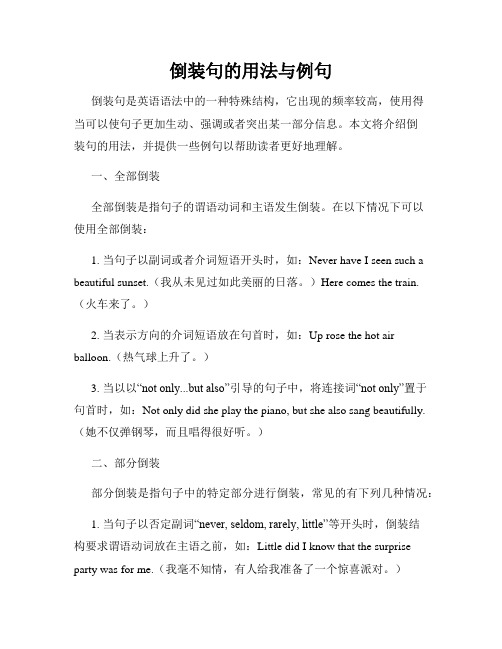
倒装句的用法与例句倒装句是英语语法中的一种特殊结构,它出现的频率较高,使用得当可以使句子更加生动、强调或者突出某一部分信息。
本文将介绍倒装句的用法,并提供一些例句以帮助读者更好地理解。
一、全部倒装全部倒装是指句子的谓语动词和主语发生倒装。
在以下情况下可以使用全部倒装:1. 当句子以副词或者介词短语开头时,如:Never have I seen such a beautiful sunset.(我从未见过如此美丽的日落。
)Here comes the train.(火车来了。
)2. 当表示方向的介词短语放在句首时,如:Up rose the hot air balloon.(热气球上升了。
)3. 当以以“not only...but also”引导的句子中,将连接词“not only”置于句首时,如:Not only did she play the piano, but she also sang beautifully.(她不仅弹钢琴,而且唱得很好听。
)二、部分倒装部分倒装是指句子中的特定部分进行倒装,常见的有下列几种情况:1. 当句子以否定副词“never, seldom, rarely, little”等开头时,倒装结构要求谓语动词放在主语之前,如:Little did I know that the surprise party was for me.(我毫不知情,有人给我准备了一个惊喜派对。
)2. 当句子以表示条件的副词或者介词短语开头时,也可以使用倒装,如:Should you need any assistance, please feel free to ask.(如果你需要任何帮助,请随时提问。
)In case of emergency, break the glass.(紧急情况下,打破玻璃。
)3. 当句子中有“so/such...that”结构时,可以使用倒装结构,如:She was so tired that not only could she not finish her homework, but she alsofell asleep in class.(她太累以至于不仅没有完成她的家庭作业,还在课堂上睡着了。
倒装句的使用场景

倒装句的使用场景倒装句是英语语法中一种重要的句式结构,它的使用场景广泛。
本文将讨论倒装句在不同语境中的应用,并对其用法进行详细解析。
一、完全倒装句1. 以副词或者短语置于句首完全倒装句通常以副词或短语作为句首,可以简化句子结构,增强语气,或强调句子的某个成分。
例如:Out rushed the crowd.倒装后:The crowd rushed out.Never have I seen such a beautiful sunset.倒装后:I have never seen such a beautiful sunset.Under the tree sat a little girl.倒装后:A little girl sat under the tree.2. 以否定词置于句首当以否定词(如not, never, seldom)置于句首时,为了强调否定意义,句子常需要完全倒装。
例如:Not a single word did he say.倒装后:He did not say a single word.Never before have I tasted such delicious food.倒装后:I have never before tasted such delicious food.Seldom does he complain about his problems.倒装后:He seldom complains about his problems.二、部分倒装句1. 以表示否定意义的词或短语置于句首部分倒装句中,只有谓语动词的一部分与主语之间发生倒装。
当以否定词或短语置于句首时,谓语动词的助动词或情态动词与主语进行倒装。
例如:Not only does she play the piano, but she also sings beautifully.倒装后:She not only plays the piano, but also sings beautifully.On no condition should you give up.倒装后:You should not give up on no condition.2. 以表地点、方式、原因的状语置于句首当以表示地点、方式或原因的状语置于句首时,为了强调状语的重要性,常需要进行倒装。
英语倒装句用法经典总结

英语倒装句用法经典总结英语倒装句是一种语法现象,用法广泛,能够提高句子的表达力和语言的鲜明度。
它常用于强调句子中的某个部分,或使句子结构更为紧凑。
下面是关于英语倒装句用法的经典总结。
一、完全倒装句1. 在句首出现的副词或短语:用于表示地点的副词(here, there)或表示方式的副词(in this way, in no case)等。
例:There goes the bus.Here comes the teacher.In no case should you tell him the secret.2. 情态动词、助动词或be动词在句首:在由情态动词(can, could, may, might, must, shall, should, will, would等)引导的疑问句或条件句中,情态动词需要放在句首。
例:Can you swim?Should you have any questions, please feel free to ask.3. 在虚拟条件句中:在虚拟条件句中,如果主语是名词,则将were放在句首。
例:Were I to win the lottery, I would buy a house.4. 否定词位于句首:如果句子中存在否定词,如never, seldom, not only...but also等,否定词需要放在句首。
例:Never have I seen such a beautiful sunset.Not only is he clever, but also hardworking.5. Only修饰副词、介词短语或状语从句时:当only修饰副词、介词短语或状语从句时,倒装现象会出现。
例:Only in this way can we solve the problem.Only when he arrived did she start to cook.6. 某些表示条件的介词短语:由in case, in the event that或on condition等表示条件的介词短语引导的句子中,介词短语需要放在句首。
英语倒装句12种类型及例句
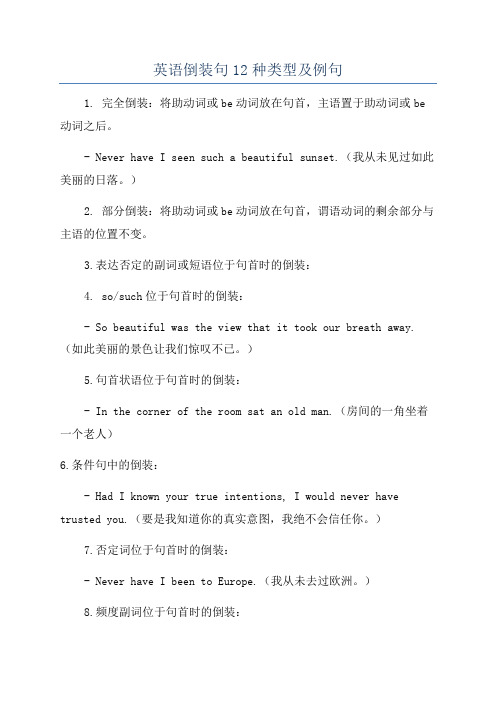
英语倒装句12种类型及例句1. 完全倒装:将助动词或be动词放在句首,主语置于助动词或be 动词之后。
- Never have I seen such a beautiful sunset.(我从未见过如此美丽的日落。
)2. 部分倒装:将助动词或be动词放在句首,谓语动词的剩余部分与主语的位置不变。
3.表达否定的副词或短语位于句首时的倒装:4. so/such位于句首时的倒装:- So beautiful was the view that it took our breath away.(如此美丽的景色让我们惊叹不已。
)5.句首状语位于句首时的倒装:- In the corner of the room sat an old man.(房间的一角坐着一个老人)6.条件句中的倒装:- Had I known your true intentions, I would never have trusted you.(要是我知道你的真实意图,我绝不会信任你。
)7.否定词位于句首时的倒装:- Never have I been to Europe.(我从未去过欧洲。
)8.频度副词位于句首时的倒装:- Rarely do we see such dedication.(我们很少见到如此的奉献精神。
)9.祈使句或祈使句部分的倒装:- Stand up!(站起来!)- Be quiet, please.(请安静。
)10. only位于句首时的倒装:- Only by working hard can you achieve your goals.(只有通过努力工作,你才能实现目标。
)11.地点状语置于句首时的倒装:- In the garden were beautiful flowers.(花园里有美丽的花朵。
)12.宾语置于句首时的倒装:- A love like this I have never felt before.(我之前从未感受过如此的爱。
倒装句的使用技巧和特殊情况

倒装句的使用技巧和特殊情况倒装句是英语中一种常用的句子结构,与常规语序相反,即将谓语动词或助动词放在主语之前。
倒装句的使用可以使句子更生动、更突出,同时也有一些特殊情况需要注意。
本文将介绍倒装句的使用技巧和特殊情况。
一、完全倒装句完全倒装句是指将整个谓语动词或助动词放在主语之前。
1.使用助动词倒装:— Are you ready for the exam?— Ready for the exam, are you?准备好考试了吗?准备好考试了。
在一般疑问句中,助动词通常位于主语之前,但在完全倒装句中,则将助动词与主语调换位置。
2.使用动词倒装:— In came the teacher with a smile on her face.— With a smile on her face, in came the teacher.老师笑着走了进来。
笑着走了进来的是老师。
在一些表达方式特殊的句子中,动词可以直接放在主语之前,使句子更加生动。
二、部分倒装句部分倒装句是指将谓语动词或助动词的某一部分放在主语之前。
常见的部分倒装句包括:否定副词、表示方向的副词、表示频率的副词、表示条件的介词短语等。
1.否定副词或词组倒装:— Never have I seen such a beautiful sunset.— Not only does she speak English, but she also speaks French.我从未见过如此美丽的日落。
她不仅会说英语,还会说法语。
在句首出现否定副词或词组时,谓语助动词或动词需要与主语倒装。
2.表示方向的副词倒装:— Up went the hot air balloon into the sky.— Down came the rain, washing away all the dust.热气球冉冉升起。
雨水下了下来,冲刷走了所有的尘埃。
在句首出现表示方向的副词时,谓语助动词或动词需要与主语倒装。
倒装句的运用知识点
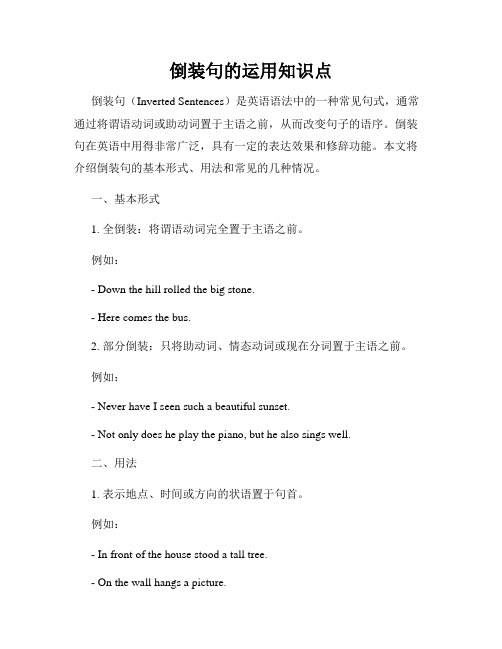
倒装句的运用知识点倒装句(Inverted Sentences)是英语语法中的一种常见句式,通常通过将谓语动词或助动词置于主语之前,从而改变句子的语序。
倒装句在英语中用得非常广泛,具有一定的表达效果和修辞功能。
本文将介绍倒装句的基本形式、用法和常见的几种情况。
一、基本形式1. 全倒装:将谓语动词完全置于主语之前。
例如:- Down the hill rolled the big stone.- Here comes the bus.2. 部分倒装:只将助动词、情态动词或现在分词置于主语之前。
例如:- Never have I seen such a beautiful sunset.- Not only does he play the piano, but he also sings well.二、用法1. 表示地点、时间或方向的状语置于句首。
例如:- In front of the house stood a tall tree.- On the wall hangs a picture.2. 强调句子的部分内容。
例如:- Only when we leave our comfort zone can we achieve greatness.- Not until the rain stopped did we continue our journey.3. 在条件句中,表示与实际情况相反的假设。
例如:- Were it not for your help, I would have failed the exam.- Had I known the truth, I would have acted differently.三、常见情况1. 在以"never"开头的句子中,谓语动词放在主语之前。
例如:- Never have I felt so alive.2. 在以"not only...but also"结构的句子中,谓语动词放在主语之前。
英语倒装句12种类型及例句
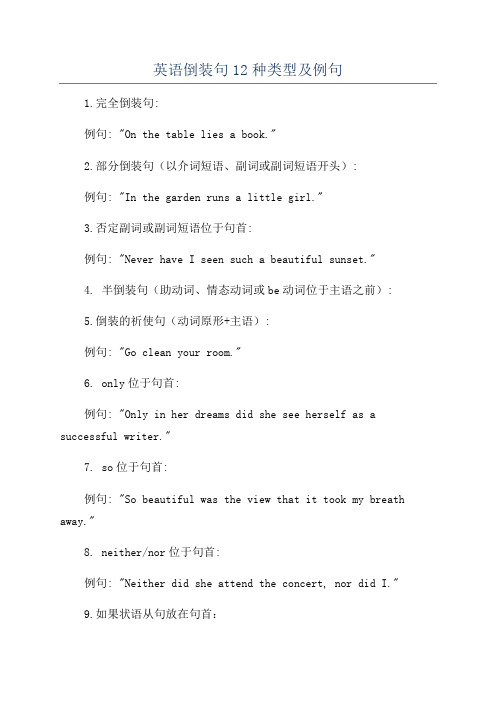
英语倒装句12种类型及例句1.完全倒装句:例句: "On the table lies a book."2.部分倒装句(以介词短语、副词或副词短语开头):例句: "In the garden runs a little girl."3.否定副词或副词短语位于句首:例句: "Never have I seen such a beautiful sunset."4. 半倒装句(助动词、情态动词或be动词位于主语之前):5.倒装的祈使句(动词原形+主语):例句: "Go clean your room."6. only位于句首:例句: "Only in her dreams did she see herself as a successful writer."7. so位于句首:例句: "So beautiful was the view that it took my breath away."8. neither/nor位于句首:例句: "Neither did she attend the concert, nor did I."9.如果状语从句放在句首:10.条件从句位于句首:例句: "Should he fail the exam, he will have to retake the course."11.介词短语或副词短语位于句首:例句: "In the corner sat a small dog."12. or/ nor引导的短语或句子位于句首:。
倒装句七种英语结构

倒装句七种英语结构
倒装句是英语语法中的一种特殊结构,常用于强调或表达语气的变化。
以下是七种常见的倒装句结构:
1. 完全倒装:主语与谓语的位置颠倒。
例如:Never have I seen such a beautiful sunset.
2. 部分倒装:将助动词或情态动词与主语的位置颠倒。
例如:Not only does he play basketball well, but he also excels in football.
3. 前置式倒装:将表示地点、时间、方向等的副词或短语放在句首并与谓语的位置颠倒。
例如:In the middle of the room stood
a big table.
4. 介词短语倒装:在表示地点、时间、原因等的介词短语前使用倒装结构。
例如:Under no circumstances should you give up your dream.
5. 句首副词倒装:将表示否定、频率、程度等的副词置于句首并与谓语的位置颠倒。
例如:Seldom have I seen such a beautiful painting.
6. 祈使句倒装:用于祈使句中,将动词与主语位置颠倒。
例如:Never mind, let's try again.
7. 条件句倒装:在条件句中,将“if”与主语的位置颠倒。
例如:Had I known the truth, I would not have gone there.
以上是七种常见的倒装句结构,掌握它们能够更加灵活地运用英
语语法,使语言表达更加生动有力。
倒装句的用法总结

倒装句的用法总结
倒装句是英语语法中一种常见的句式结构,用于强调句子的其中一部分或在特定情况下使用。
以下是关于倒装句的用法总结:
1. 将助动词置于主语之前的倒装句:在一般疑问句中,助动词被置于主语之前,例如:"Do you like chocolate?"(你喜欢巧克力吗?)在以否定形式构成的句子中,助动词和表示否定的词一起置于主语之前,例如:"She does not want to go."(她不想去。
)
2. 在以副词或介词短语开头的句子中的倒装句:在以副词或介词短语开头的句子中,主语和谓语动词发生倒装,例如:"Seldom do I go to parties."(我很少去参加派对。
)另一个例子是:"Under the table lies a hidden treasure."(桌子下面藏着一份隐藏的宝藏。
)
3. 在强调句中使用倒装句:为了强调句子中的其中一部分,可以使用倒装句,例如:"It was John who broke the vase."(是约翰打破了花瓶。
4. 在以否定副词或短语开头的句子中的倒装句:当句子以否定副词或短语开头时,主语和谓语动词发生倒装,例如:"Never have I seen such a beautiful sunset."(我从未见过如此美丽的日落。
)需要注意的是,虽然倒装句在英语中常见,但并不是所有情况下都需要使用倒装句。
因此,在使用倒装句时,需要根据具体语境和句子结构来决定是否使用。
倒装句的用法
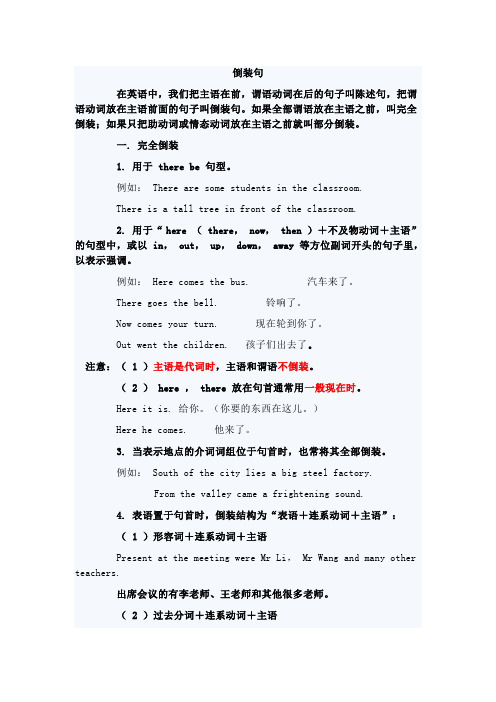
倒装句在英语中,我们把主语在前,谓语动词在后的句子叫陈述句,把谓语动词放在主语前面的句子叫倒装句。
如果全部谓语放在主语之前,叫完全倒装;如果只把助动词或情态动词放在主语之前就叫部分倒装。
一. 完全倒装1. 用于 there be 句型。
例如: There are some students in the classroom.There is a tall tree in front of the classroom.2. 用于“ here ( there, now, then )+不及物动词+主语”的句型中,或以 in, out, up, down, away 等方位副词开头的句子里,以表示强调。
例如: Here comes the bus. 汽车来了。
There goes the bell. 铃响了。
Now comes your turn. 现在轮到你了。
Out went the children. 孩子们出去了。
注意:( 1 )主语是代词时,主语和谓语不倒装。
( 2 ) here , there 放在句首通常用一般现在时。
Here it is. 给你。
(你要的东西在这儿。
)Here he comes. 他来了。
3. 当表示地点的介词词组位于句首时,也常将其全部倒装。
例如: South of the city lies a big steel factory.From the valley came a frightening sound.4. 表语置于句首时,倒装结构为“表语+连系动词+主语”:( 1 )形容词+连系动词+主语Present at the meeting were Mr Li, Mr Wang and many other teachers.出席会议的有李老师、王老师和其他很多老师。
( 2 )过去分词+连系动词+主语Gone are the days when we used foreign oil.我们使用洋油的日子一去不复返了。
倒装句用法归纳整理

完全倒装&部分倒装一、完全倒装( 5items )1. 表示动作趋向的副词置于句首时且主语是名词,动词是表示运动或存现:Here/ There ;In / Out; Up/Down; Away + be/come/go/ rush/run + 主语Eg. Here comes the bus. There goes the bell.Up flew the balloon. Down fell the apples from the tree.Away went the angry manager. IncameMr. Wang.2. 时间副词 Now/ Then 置于句首,主语是名词,动词是趋向或存现动词go/come/be/rush/run 等Eg. Now comes your turn. Then starts another programme.3.地点介词作状语放在句首,主语是名词,动词表存现On top the mountain stands an old tree.At the foot of the hill lies a village.In front of the village runs a stream.4 .代词前置Such was Einstein, a great and cute man .5.表语前置(现在分词、过去分词、形容词)时实行完全倒装Walking beside me were some visitors from abroad.Gone are the days when the Chinese were looked down upon by foreigners. Attached to the meeting was a card.Present at the meeting were some leaders of the town.二、部分倒装( 10items )1. 否定词或半否定词置于句首,部分倒装Never/ Hardly/Seldom/ Little/Nowhere/ By no means … +助+主语Little does she care about what she looks.By no means will I forgive you.2. Not only+助+主谓 but also +主谓,前倒后不倒Not only had he sold out his house but he also sold his baby for drugs.3. Not until+主谓+助主谓,前不倒后倒Not until I began to work did I know how much I needed to learn.另外注意 It is not until …that…句型4. So /Neither/Nor 放在句首用部分倒装---He loves football. ---So do I.---He never swims. ----Neither/Nor does his girlfriend.5. Hardly/ No sooner had sb done when/ than sb did sth.Hardly had they arrived when it began to rain.6. So …that …/ Such …that 前倒后不倒So happy were the audiences that they laughed again and again. Such good weather is it that we feel like going outing.7. as/though 引导的让步状语从句( 4items )Child as he is, he manages to make a living by working in a factory.Strange as his idea might sound, it was a accepted at last.Hard as I tried, I couldn ’tpersuade her.Try as he might, he couldn ’t pass the exam.8. Only+状语(从句)置于句首,主句用倒装Only in this way can you improve your English.Only whenI became a mother myself did I know how tired my mother oncewas.9. 省略 if 的虚拟条件句中,将助动词 had/should/were 等提前,如果这些助动词跟有否定词 not, not 不提前If it hadn’t been for your timely help, I would still be in trouble now.= Had it not been for your timely help, I would still be in trouble now.10. 祝愿May you be happy !。
英语倒装句的用法及举例

主语和谓语是句子的核心,它们之间有两种语序:一是主语在谓语之前称为自然语(Natural Order);二是主语在谓语之后则称为倒装语序(Inverted Order)。
而倒装语序中又有全部倒(Full Inversion)和部分倒装(Partial Inversion)两种情况。
1. 倒装句之全部倒装全部倒装是只将句子中的谓语动词全部置于主语之前。
此结构通常只用与一般现在时和一般过去时。
常见的结构有:1) here, there, now, then,等副词置于句首, 谓语动词常用be, come, go, lie, run。
There goes the bell.Then_________________.老师来了。
Now ________________.现在轮到你了。
2)地点状语置于句首,谓语表示运动的动词。
___________________________________________________________________________________ ___________________________________________________________________________________ _________________他来了。
_________________ 她们走出去了。
______________________2. 倒装句之部分倒装部分倒装是指将谓语的一部分如助动词或情态倒装至主语之前。
如果句中的谓语没有助动词或情态动词,则需添加助动词do, does或did,并将其置于主语之前。
1) 句首为否定或半否定的词语,如no, not, never, seldom, little, hardly, at no time, in no way, notuntil… 等Never_____________such a performance. 我从未见过如此好的表演。
倒装句型结构及用法英语

倒装句型结构及用法英语倒装句是指在句子中调换主语和谓语动词的正常语序,或将动词提前至主语之前的结构。
这种结构在英语中有多种用法,以下是一些常见的倒装句型及其用法:完全倒装:结构:倒装句的完全形式是将助动词或情态动词放在主语之前。
例子:Never have I seen such a beautiful sunset.(我从未见过如此美丽的日落。
)否定副词倒装:结构:当否定副词放在句首时,需要对句子进行倒装。
例子:Rarely does he complain about his workload.(他很少抱怨工作负担。
)表示方向、地点的副词倒装:结构:表示方向、地点的副词位于句首时,句子需要进行倒装。
例子:Up the hill ran the children.(孩子们跑上了山。
)only 修饰副词、介词短语时的倒装:结构:当"only" 修饰副词或介词短语时,通常需要将其置于句首并进行倒装。
例子:Only after finishing his homework can he go out.(只有完成作业,他才能出去。
)so 和neither 引导的倒装句:结构:当"so" 或"neither" 用于引导对等结构的倒装句时,主谓语序颠倒。
例子:"I love pizza." - "So do I."("我喜欢披萨。
" - "我也是。
")倒装问句:结构:在一般陈述句的基础上,将助动词或情态动词提前至主语之前,形成疑问句。
例子:You have finished your homework. →Have you finished your homework?这些是一些常见的倒装句型及其用法。
需要注意的是,并非所有情况下都适用倒装结构,而是要根据具体语境和语法规则来判断。
倒装句的四种情况与用法总结

倒装句的四种情况与用法总结倒装句是英语语法中的一种特殊结构,其谓语动词与主语的位置颠倒。
它的运用可以增添句子的丰富性和多样性,使文章表达更加精确和简洁。
本文将介绍倒装句的四种常见情况与用法。
一、完全倒装句完全倒装句的结构是:助动词/情态动词+主语+谓语动词。
这种倒装句常用于以下情况:1.以表示地点或方向的副词开头例如:Up the hill ran the little boy.Down the road came a black cat.2.以表示频率或程度的副词开头例如:Rarely have I seen such a beautiful sunset.So loudly did he speak that everyone turned to look.3.以表示否定意义的副词开头例如:Never have I heard such a bizarre story.Not until then did I realize the severity of the situation.二、部分倒装句部分倒装句是指将助动词/情态动词提前至句首,主语和谓语动词的位置保持不变。
这种倒装句常用于以下情况:1.以表示反义意义的副词开头例如:Hardly had he arrived home when the phone rang.Barely had she finished her speech when the audience applauded.2.以表示条件的状语从句开头例如:Should you need any assistance, please do not hesitate to contact me.Had it not been for your help, I would have failed the exam.三、拓展倒装句拓展倒装句是将某些表语、状语或其他成分提前至句首,与谓语动词形成倒装结构。
语法中的倒装句用法详解

语法中的倒装句用法详解倒装句是英语语法中常见的一种句型,它在句子结构和语序上与一般句子相比有所不同。
倒装句的用法多样,包括完全倒装句、部分倒装句和条件状语从句中的倒装句等。
本文将详细解释倒装句的用法及其相关规则,并引用示例句子加以说明。
一、完全倒装句完全倒装句是指将助动词或情态动词放在句首,主语紧随其后,动词短语(或谓语)置于主语之后。
完全倒装句的常见情况有以下几种:1. 当表示地点或方向的副词置于句首时:例句:Up the hill ran the little boy.(小男孩跑上了山坡。
)例句:Here comes the bus.(车来了。
)例句:Out rushed the crowd when the door opened.(门一开,人群冲了出去。
)2. 当表示时间的副词或短语置于句首时:例句:Yesterday was I absent from school.(昨天我没去上学。
)例句:In a few minutes will the ceremony begin.(几分钟后,典礼将开始。
)例句:At the age of ten did he start learning the piano.(十岁时他开始学钢琴。
)3. 当以“here”或“there”开头时:例句:Here comes the bride.(新娘来啦。
)例句:There goes the alarm.(警报响了。
)例句:There hides a treasure in the cave.(洞里藏着一处宝藏。
)二、部分倒装句部分倒装句是指将助动词、情态动词或谓语动词的某些形式放在句首,主语置于动词之后,另一部分谓语成分仍位于句尾。
部分倒装句的常见情况如下:1. 在问句中:例句:Do you speak English?(你会讲英语吗?)例句:Have you finished your homework?(你完成作业了吗?)例句:Can he swim?(他会游泳吗?)2. 在以“never”、“seldom”、“rarely”、“not until”等否定副词或短语开头的句子中:例句:Never have I seen such a beautiful sunset.(我从未见过如此美丽的日落。
详解英语倒装句的各种句式及用法,看完一遍掌握全部
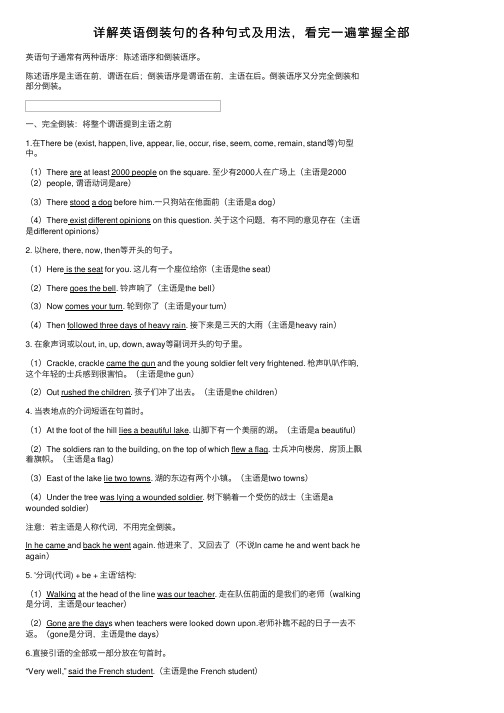
详解英语倒装句的各种句式及⽤法,看完⼀遍掌握全部英语句⼦通常有两种语序:陈述语序和倒装语序。
陈述语序是主语在前,谓语在后;倒装语序是谓语在前,主语在后。
倒装语序⼜分完全倒装和部分倒装。
⼀、完全倒装:将整个谓语提到主语之前1.在There be (exist, happen, live, appear, lie, occur, rise, seem, come, remain, stand等)句型中。
(1)There are at least 2000 people on the square. ⾄少有2000⼈在⼴场上(主语是2000(2)people, 谓语动词是are)(3)There stood a dog before him.⼀只狗站在他⾯前(主语是a dog)(4)There exist different opinions on this question. 关于这个问题,有不同的意见存在(主语是different opinions)2. 以here, there, now, then等开头的句⼦。
(1)Here is the seat for you. 这⼉有⼀个座位给你(主语是the seat)(2)There goes the bell. 铃声响了(主语是the bell)(3)Now comes your turn. 轮到你了(主语是your turn)(4)Then followed three days of heavy rain. 接下来是三天的⼤⾬(主语是heavy rain)3. 在象声词或以out, in, up, down, away等副词开头的句⼦⾥。
(1)Crackle, crackle came the gun and the young soldier felt very frightened. 枪声叭叭作响,这个年轻的⼠兵感到很害怕。
(主语是the gun)(2)Out rushed the children. 孩⼦们冲了出去。
句型倒装的常见形式与应用

句型倒装的常见形式与应用句型倒装是英语语法中一个重要的语法现象,它可以通过改变句子的语序来达到多种不同的表达方式。
在句型倒装中,动词和主语的位置发生了颠倒,这在英语中相当常见,并且有多种形式和应用。
本文将探讨句型倒装的常见形式和应用。
一、完全倒装句完全倒装句是句型倒装的一种常见形式,它在特定的语境中使用,通常用于以下几种情况:1. 在以副词或短语开头的句子中,例如:- Here comes the bus. (公交车来了。
)- Up went the balloon. (气球升起来了。
)2. 在以表示地点的介词短语开头的句子中,例如:- On the top of the mountain stood a small cabin. (小屋矗立在山顶上。
)- In the corner of the room sat a little girl. (一个小女孩坐在房间的角落里。
)3. 在以表示否定或限制的词语开头的句子中,例如:- Never have I seen such a beautiful sunset. (我从未见过如此美丽的日落。
)- Not only does he play the piano, but he also sings well.(他不仅会弹钢琴,而且唱歌也很好。
)二、部分倒装句部分倒装句是句型倒装的另一种常见形式,它通常在以下几种情况下使用:1. 在以表示否定的词语开头的句子中,例如:- Never before have I seen such a beautiful beach.(以前从未见过如此美丽的海滩。
)- Under no circumstances will I allow you to go there alone.(在任何情况下,我都不会允许你独自去那里。
)2. 在以表示“only”开头的句子中,例如:- Only when we face our fears can we overcome them.(只有当我们直面恐惧时,我们才能克服它们。
英语倒装句的四种基本句型例句

英语倒装句的四种基本句型例句嗨,小伙伴们!今天咱们来好好唠唠英语倒装句的四种基本句型,这可真是英语学习里超有趣的一部分呢。
就像一场奇妙的语言魔术,让句子变得超级有特色。
**一、完全倒装(Full Inversion)**完全倒装就是把整个谓语动词都放到主语之前啦。
这就好比是把一场演出的主角(主语)和配角(谓语)的出场顺序完全颠倒了一下,给人一种很新奇的感觉。
例句1:There goes the bell.(铃响了。
)你看,正常的语序应该是The bell goes there. 但是这样一倒装,就有一种突然性,就像你正等着什么事情发生,然后“铃就响了”,这种表达更加生动。
我还记得我刚学这个的时候,我同学问我:“为啥要这么说呀?直接说The bell goes there不就得了?”我就跟他说:“哎呀,这就像你去看魔术表演,魔术师要是按平常的方式出牌,那还有啥惊喜呢?这种倒装句就像魔术里的大变活人,突然把主语和谓语的位置变了,让句子变得超酷。
”例句2:Here comes the bus.(公共汽车来了。
)想象一下,你在车站等车等得心急火燎的,然后你大喊一声“Here comes the bus”,是不是感觉比“The bus comes here”更带感呢?这时候句子就像是一个充满活力的小助手,快速地把重要的信息“bus来了”传达给你。
例句3:Away flew the birds.(鸟儿飞走了。
)这个句子要是正常说就是The birds flew away. 可一旦倒装,就像是我们在描述一个很突然的画面,鸟儿“嗖”的一下就飞走了,那种动态感更强了。
我跟我的英语老师讨论这个句子的时候,老师说:“你看,这种倒装就像是给句子加了个加速器,让动作更迅速地呈现在读者或者听者的脑海里。
”我当时就觉得,哇塞,真的是这样呢!**二、部分倒装(Partial Inversion)**部分倒装呢,就是只把助动词、情态动词或者be动词放到主语前面,主要动词还在主语后面呢。
- 1、下载文档前请自行甄别文档内容的完整性,平台不提供额外的编辑、内容补充、找答案等附加服务。
- 2、"仅部分预览"的文档,不可在线预览部分如存在完整性等问题,可反馈申请退款(可完整预览的文档不适用该条件!)。
- 3、如文档侵犯您的权益,请联系客服反馈,我们会尽快为您处理(人工客服工作时间:9:00-18:30)。
主语和谓语是句子的核心,它们之间有两种语序:一是主语在谓语之前称为自然语(Natural Order);二是主语在谓语之后则称为倒装语序(Inverted Order)。
而倒装语序中又有全部倒(Full Inversion)和部分倒装(Partial Inversion)两种情况。
1. 倒装句之全部倒装全部倒装是只将句子中的谓语动词全部置于主语之前。
此结构通常只用与一般现在时和一般过去时。
常见的结构有:1) here, there, now, then,等副词置于句首, 谓语动词常用be, come, go, lie, run。
There goes the bell.Then_________________.老师来了。
Now ________________.现在轮到你了。
2)地点状语置于句首,谓语表示运动的动词。
___________________________________________________________________________________ ___________________________________________________________________________________ _________________他来了。
_________________ 她们走出去了。
______________________2. 倒装句之部分倒装部分倒装是指将谓语的一部分如助动词或情态倒装至主语之前。
如果句中的谓语没有助动词或情态动词,则需添加助动词do, does或did,并将其置于主语之前。
1) 句首为否定或半否定的词语,如no, not, never, seldom, little, hardly, at no time, in no way, notuntil… 等Never_____________such a performance. 我从未见过如此好的表演。
Nowhere____________ the answer to this question. 你在哪里都找不到这个问题的答案。
Not until t______________________________________.直到孩子睡着妈妈才离开房间。
1) Why can't I smoke here?At no time___ in the meeting-roomA. is smoking permittedB. smoking is permittedC. smoking is it permittedD. does smoking permit2)Not until the early years of the 19th century ___ what heat is.A. man did knowB. man knowC. didn't man knowD. did man know以否定词开头作部分倒装如Not only…but also, Hardly/Scarcely…when, No sooner… thanNot only did he refuse the gift, he also severely criticized the sender.Hardly had she gone out when a student came to visit her.No sooner had she gone out than a student came to visit her.典型例题No sooner___ than it began to rain heavily.A. the game beganB. has the game begunC. did the game beginD. had the game begun2). so, neither, nor作部分倒装表示"也"、"也不" 的句子要部分倒装。
Tom can speak French. _____________ Jack.If you won't go, _______________ I.---Do you know Jim quarrelled with his brother?---I don't know, _____.A. nor don't I careB. nor do I careC. I don't care neitherD. I don't care also3). only+状语在句首要倒装的情况Only after being asked three times did he come to the meeting.Only when he is seriously ill does he ever stay in bed.___________________________________.只有用这种方法你才能学好英语。
4)so/ such … that句型中的so/such 位于句首时,需倒装。
So frightened was he that he did not dare to move an inch.1.I finally got the job I dreamed about. Never in my life _____ so happy.(NMET2000)A. did I feelB. I feltC. I had feltD. had I felt2. Not a single song ____ at yest erday’s party.(2000年上海)A. she sangB. sand sheC. did she singD. she did sing3. _____ can you expect to get a pay rise.(2000年北京春季)A. With hard workB. Although work hardC. Only with hard workD. Now that he works hard4. Only when the war was over _____ to his hometown.(2001上海春季)A. did the young soldier returnB. the young soldier returnedC. returned the young soldierD. the young soldier did return5. –You forgot your purse when you went out.–Good heavens! _____.(2002上海)A. so did IB. so I didC. I did soD. I so did6. Not only _____ interested in football but _____ beginning to show an interest in it.(2002上海春季)A. the teacher himself is; all his students areB. the teacher himself is; are all his studentsC. is the teacher himself; are all his studentsD. is the teacher himself; all his students are7. The old couple have been married for 40 years and never once _____ with each other.A. they had quarreledB. they have quarreledC. have they quarreledD. had they quarreled8. _____ snacks and drinks, but they also brought cards for entertainment when they had a picnic inthe forest.(2004上海)A. Not only they broughtB. Not only did they bringC. Not only brought theyD. Not only they did bring9. I failed in the last examination last term and only then _____ the importance of studies.(2004重庆)A. I realizedB. I had realizedC. had I realizedD. did I realize10. Of the making of good books ther e is no end; neither _____ any end to their influence on man’slives.(2004广东)A. there isB. there areC. is thereD. are there11. Maybe you have been to many countries, but nowhere else _____ such a beautiful palace.A. can you findB. you could findC. you can findD. could you find12. –I would never come to this restaurant again. The food is terrible.–_____.(2004广西)A. Nor am I B. Neither would I C. Same with me D. So do I13. Mary never does any reading in the evening, _____.(NMET2005)A. so does Jo hnB. John does tooC. John doesn’t tooD. nor does John14. Never before _____ in greater need of modern public transport than it is today. (2005上海)A. has this city beenB. this city has beenC. was this cityD. this city has15. They have a good knowledge of English but little _____ they know about German.(2005天津)A. haveB. didC. hadD. do16. –Well, I do think the rabbit is a beautiful, gentle animal which can run very fast.–_____.(2005辽宁) A. So it is B. So is it C. So does it D. So it does17. In the dark forest _____, some large enough to hold several English towns.A. stand many lakesB. lie many lakesC. many lakes lieD. many lakes stand18. Only after my friend came _____.(2005福建)A. did the computer repairB. he repaired the computerC. was the computer repairedD. the computer was repaired19. –Father, you promised!–Well, _____. But it was you who didn’t keep your word first.(2005湖北)A. so was IB. so did IC. so I wasD. so I did21. –Maggie had a wonderful time at the party.–_____, and so did I.(2005安徽)A. So she hadB. So had sheC. So she didD. So did she22. _____ about wild plants that they decided to make a trip to Madagascar for further research.(2005江苏)A. So curious the couple wasB. So curious were the coupleC. How curious the couple wereD. The couple was such curious24. Only in this way _____ to make improvement in the operating system.A. you can hopeB. you did hopeC. can you hopeD. did you hope25. Just in front of our house _____ with a history of 1,000 years.(2006上海春季)A. does a tall tree standB. stands a tall treeC. a tall tree is standingD. a tall tree stands27. I’ve tried very hard to improve my English. But by no means _____ with my progress.(2006重庆)A. the teacher is not satisfiedB. is the teacher not satisfiedC. the teacher is satisfiedD. is the teacher satisfied28. _____ by keeping down costs will PowerData hold its advantage over other companies.(2006浙江)A. Only B. Just C. Still D. Yet29. Never in my wildest dreams _____ these people are living in such poor conditions.A. I could imagineB. could I imagineC. I couldn’t imagineD. couldn’t I imagine30. So difficult _____ it to work out the problem that I decided to ask Tom for advice.A. I did findB. did I findC. I have foundD. have I found31. _______homework did we have to do that we had no time to take a rest.A. So muchB.Too muchC. Too littleD. So little32. –It’s burning hot today, isn’t it?–Yes. _____ yesterday.(2006陕西)A. So was itB. So it wasC. So it isD. So is it[参考答案和提示] 1. A 2. C. 3. C 4. A 5. B 6. D 7. C 8. B 9. D 10. C 11. A 12. B 13. D. 14. A 15. D 16. A 17. B 18. C 19. D 20. B 21. C 22. B 23. A 24. C 25. B 26. C 27. D 28. A 29. B 30. B 31. A 32. A。
